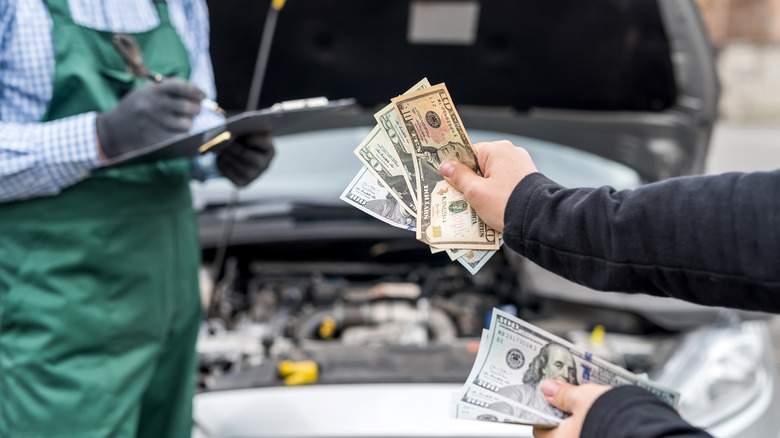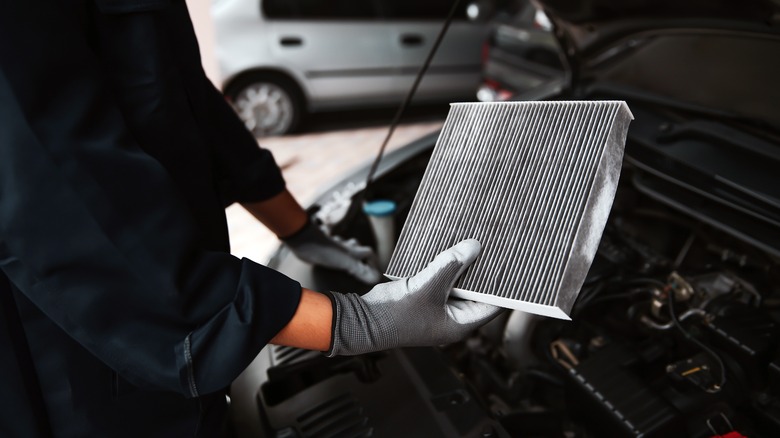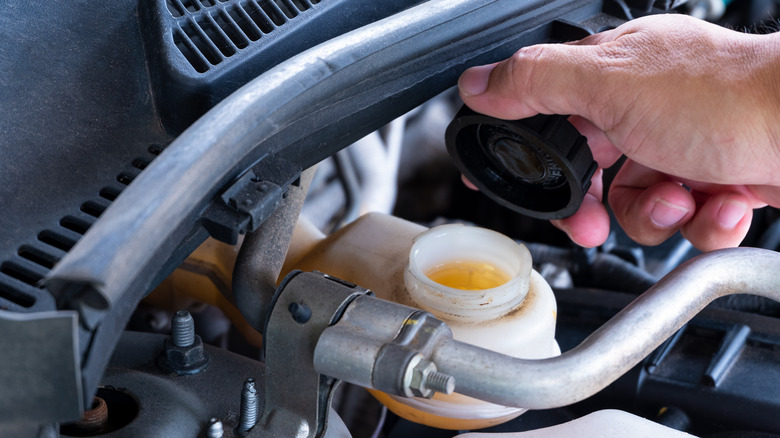
Izusek/Getty Images
It’s a tale as old as time. An unsuspecting person takes their car to the local auto mechanic for a routine check-up or repair, only to be told it needs a series of unexpected and expensive repairs. Since the average car owner doesn’t know a lot about what’s going on under the hood of their car, they’re faced with an unpleasant dilemma: trust the mechanic and potentially pay for unnecessary work or ignore the recommendations and risk compounding the problems with their vehicle and spending even more money down the line. Given these options, it’s no wonder most people find going to the mechanic intimidating and fear they’re getting the short end of the stick when it comes to auto repairs.
While there are honest mechanics who don’t make a living off of taking advantage of unknowledgeable customers, plenty won’t think twice about recommending a new transmission for your car, knowing full well it doesn’t need it. That’s why, before setting foot in an auto repair shop, you should become familiar with the scams mechanics might use to separate you from your hard-earned money. There’s no need to become an expert, but a little bit of knowledge and awareness can go a long way toward helping you avoid being taken for a ride by an unscrupulous mechanic.
Lack of transparency in pricing

Alfexe/Getty Images
Even in the internet age, getting transparent pricing information about the cost of car repairs can be an uphill battle. That’s because prices often vary from one repair shop to another within the same city, leaving many consumers scratching their heads and wondering if it’s even possible to get an honest quote from an auto mechanic. As commonplace as a lack of transparency is in auto repair pricing, if you want to avoid getting ripped off when you take your car in to have it fixed, it’s important to make sure your mechanic is upfront with you about all costs before agreeing to any repairs.
If a mechanic makes excuses not to tell you how much you’ll be charged for a service, that’s a huge red flag. When it’s time to pay your bill, you may find hidden fees or additional charges in the form of extra parts or labor that they didn’t discuss with you before starting work on your vehicle. An honest mechanic will be willing to give you an estimate detailing how much repairs will cost before getting started. Labor, parts, and other charges should be included in this breakdown. If they’re unwilling to do so, it’s a sign you should take your car elsewhere.
Recommending unnecessary repairs

Peopleimages/Getty Images
If you go to the mechanic for an oil change only for them to tell you your car needs a long list of additional, expensive repairs, it would be advisable to proceed with caution. Upselling is one of the most common ways for dealerships and independent repair shops to bill you for services or parts that aren’t immediately necessary or, in some cases, aren’t needed at all. If you don’t know a lot about cars, identifying this tactic can be challenging, and you may find that mechanics try to test your knowledge to see how much they can get away with.
However, if your car was running fine before you arrived at the mechanic and suddenly there’s a whole list of things wrong, you should think twice before signing up for the repairs. For example, they suggest a complete engine overhaul when your car only needs a minor fix. Being familiar with your vehicle’s maintenance schedule, often found in the owner’s manual, can help you gauge whether a repair is needed or not, and seeking a second opinion when you’re in doubt can also help. When a mechanic recommends services beyond standard preventative maintenance without clear justification, they might be trying to upsell you.
Inconsistent diagnoses

Eakrin Rasadonyindee/Shutterstock
One of the quickest ways for an auto mechanic to drain your bank account is through inconsistent diagnoses. If you take your car to an auto shop and receive different diagnoses for a problem or they can’t give you a straightforward answer about what’s wrong, it should set off alarm bells. Whether it’s due to a lack of experience or they’re intentionally misleading you, this inconsistency could lead to unnecessary repairs, wasted money, and leave your car with unresolved issues.
In contrast, when you’re dealing with a reliable mechanic, they’ll systematically diagnose problems with your vehicle, often using advanced diagnostic tools and their knowledge from years of on-the-job experience. This process allows them to get to the root cause of the issue and ensure it’s correctly identified, eliminating the guesswork that can lead to inconsistent diagnoses. While there will be times that a mechanic gets it wrong, if it happens over and over again, it’s time to question their motives.
If you suspect your mechanic is giving you the run-around when diagnosing problems with your vehicles, it’s best to ask for a detailed explanation before moving forward. A trustworthy mechanic will be able to explain the diagnosis in a way you can understand, including why your car needs a specific repair. On the other hand, an untrustworthy may avoid answering your questions or offer vague or overly technical explanations without providing a clear justification for the repairs.
High-pressure sales tactics

Blackcat/Getty Images
It’s a familiar feeling: You walk into a repair shop looking for a simple solution and walk out with more questions than answers. You may have thought the issues with your vehicle were minor, but the mechanic recommended several services you had no idea you needed. Not only that, they do so in an aggressive manner, pressuring you to commit to services you may not even need now or ever. This tactic can be particularly effective if you don’t know a lot about car maintenance, especially since the mechanic will often have a sense of urgency when making these recommendations and warn you of the dire consequences if you fail to act immediately.
If a mechanic recommends you get your transmission, cooling system, or fuel injectors flushed, you should think twice about it and check your vehicle’s owner’s manual before going forward. While these services aren’t scams in and of themselves and won’t damage your car, they are big money-makers for auto shops, and they’re something you may not need. Understanding the difference between helpful advice and high-pressure sales is vital to not falling for high-pressure techniques. When a mechanic gives you helpful advice, it’ll align with your manufacturer’s maintenance schedule, and they won’t pressure you into making an immediate decision.
Creating work for themselves

Kritchai7752/Shutterstock
Intentionally damaging your car when you bring it in for an inspection or to be serviced is one of the most common ways dishonest mechanics take advantage of customers. This unethical practice might involve a mechanic cutting a fan belt and ripping a CV boot on a front-wheel-drive vehicle in a way that makes it look like that damage is a result of normal wear and tear and needs to be replaced immediately. Unfortunately, that’s not the end of it; mechanics might spray oil on parts or create small punctures to simulate leaks and damage.
These underhanded strategies are especially problematic because they convince you something really is wrong with your car, like a power steering rack appearing to leak due to artificially introduced dirty oil. As a result, you may agree to unwarranted repairs or replacements, driving up your out-of-pocket costs. What makes this scam so hard to recognize is that it’s so subtle that car owners often don’t even realize what’s going on. Since this scam is hard to detect, instead of agreeing to have the extra work done immediately, it’s a good idea only to get the work done on your car that you know you need. Then, drive around in your car for a few weeks to see if you notice the problem. If you don’t, there’s a good chance your mechanic was trying to trick you into paying for unnecessary repairs.